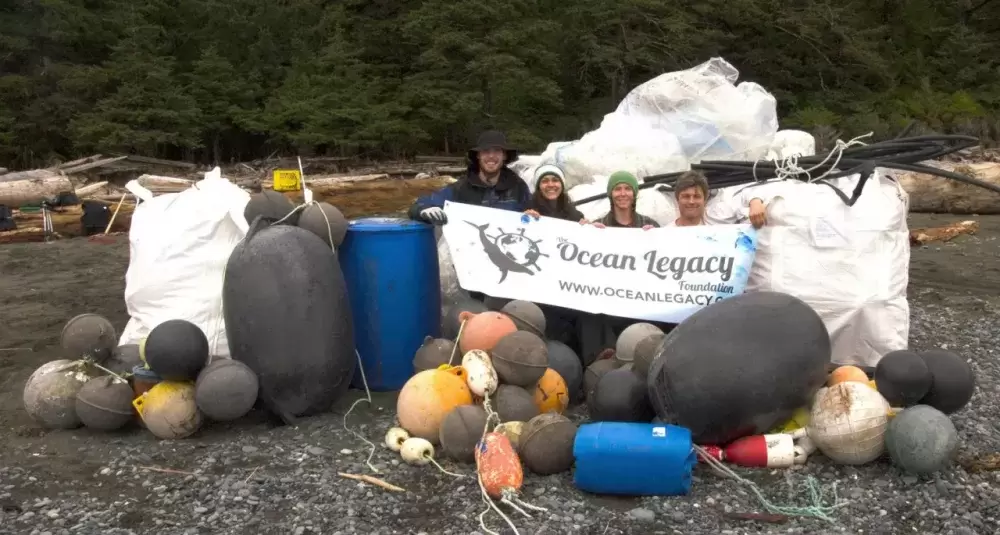When you think of Yuquot, the beautiful, remote, summer home of the Mowachaht/Muchalaht, you might envision old growth forests fringed by a gravel beach roaring with the rolling waves of the Pacific Ocean. But, even with its remote location on northern Vancouver Island, Yuquot is not immune from being littered by some of the five trillion individual pieces of plastic estimated to be floating in our ocean.
A team from Ocean Legacy Foundation arrived in Yuquot in late September to tackle the western shoreline of Yuquot. Their focus is on the plastic in its various forms that are deposited on the beach by the tides.
The Ocean Legacy Foundation regularly organizes cleaning expeditions with small qualified groups that collect plastic pollution both in the ocean and along the shorelines. They pick up plastics of all sizes and types, from Styrofoam floats, to plastic fishing floats. They pick up all types of plastic containers like trash bins, fuel canisters, water bottles and food containers. They also pick up plastic ropes and nets.
According to long-time local resident Ray Williams, about 18 volunteers from Ocean Legacy Foundation arrived at Yuquot in late September. They came from Vancouver, he said, and are staying in and around the church.
According to Williams, they cleaned about a mile of beach, all the way to the northern-most point. The plastics they collected were piled on the dock in Yuquot, waiting to be picked up and taken away.
“There’s 43 tires stacked on the wharf and eight to 10 big bags of garbage,” said Williams.
He described the bags as being the size of industrial fish farm feed bags, which are many times larger than house or garden trash bags.
The Ocean Legacy Foundation is an international non-profit organization that not only conducts clean-up expeditions but is also involved in education and research efforts.
The plastic that they collect does not simply go to a landfill, but is used for innovative new technologies like plastic to fuel, which converts the refuse into fuels such as gasoline or diesel. About 90 per cent of plastics collected on the beaches and ocean is recyclable.
Over a few decades, humans have managed to dump tons upon tons of garbage into the ocean. This pollution is devastating not only to fish and wildlife, but also to humans because plastics take thousands of years to decay.
According to Marine Litter Solutions, the debris is not only ugly – it can harm ocean ecosystems, wildlife, and humans. It can injure coral reefs and bottom dwelling species and entangle or drown ocean wildlife. Some marine animals ingest the litter and choke or starve.
Plastics, over time break down and leach toxins into the ocean. As a result, fish and wildlife are becoming poisoned.
According to Teach the Earth, plastics don't biodegrade; they break up into tiny pieces that are consumed by fish and sea mammals. “Plastic is killing more than 100,000 sea turtles and birds a year from ingestion and entanglement.”
In November 2017, MP Gord Johns introduced a motion in the House of Commons that proposes a strategy to reduce consumer and industrial use of single-use plastics. Included in the motion are other measures to address waste plastic including regular funding for an education campaign, community-led cleanup projects and a plan to clean up derelict fishing gear.
But by late September 2018, the motion has yet to be supported by the House.
On Sept. 20 the Minister of Environment announced that the government will ban single use plastics from federal institutions and will recycle 75 per cent of its plastics by 2030. During the Sept. 24 Question Period Johns pointed out that the government's plan won't meet international goals on plastic reduction and he asked that the members of parliament support his motion for a national ocean plastics strategy.
"The Liberals say they are prioritizing ocean plastics but their recent announcement lacks the urgency and funding that coastal communities were counting on", Johns said during Question Period.
He pointed out residents of Denman Island, which lies between Vancouver Island and the Lower Mainland, pulled six tonnes of plastics from Baynes Sound on the weekend.







